A pivotal moment in Robin Wright’s personal life is her romance with British-Australian architect Henry Smith. This moment feels remarkably similar to a narrative shift that many celebrities experience later in their careers. Following decades of public scrutiny, emotional turmoil, and high-profile marriages, she has embraced companionship in a way that is especially advantageous to her stage of life. She has been open about her decision to not get married again at the age of 59, stating that it is unnecessary. This admission feels incredibly effective and refreshingly contemporary.
Wright’s sense of calm significantly enhances Smith’s distance from the typical Hollywood spotlight. Instead of dealing with the pressures of the industry, her partner is grounded and stable, qualities she now values more than glitz. It is similar to Jennifer Lawrence’s marriage to art dealer Cooke Maroney, which felt like a very effective way to protect privacy, or Julia Roberts’ choice to wed cameraman Danny Moder, which offered a surprisingly inexpensive escape from the never-ending spotlight of celebrity.
Unusual circumstances led to the development of their love tale. They became close during the challenging months of COVID-19, when they were both sick, after meeting in a pub. The revelation of compatibility during that time was particularly clear, and Wright later characterized it as a fast-track to intimacy. She was reminded that authenticity frequently blossoms in unexpected places by the fact that the intensity of lying side by side—crying, laughing, and surviving—streamlined the process of discovery in incredibly versatile ways.
Table: Robin Wright – Bio, Career, and Personal Life
| Category | Details |
|---|---|
| Full Name | Robin Gayle Wright |
| Date of Birth | April 8, 1966 |
| Age | 59 (as of 2025) |
| Birthplace | Dallas, Texas, USA |
| Profession | Actress, director, producer |
| Notable Works | House of Cards, Forrest Gump, Wonder Woman |
| Awards | Golden Globe Award, Satellite Award |
| Current Partner | Henry Smith (British-Australian architect) |
| Previous Spouses | Dane Witherspoon (1986–1988), Sean Penn (1996–2010), Clément Giraudet (2018–2022) |
| Children | Dylan Penn (born 1991), Hopper Penn (born 1993) |
| Reference Link | https://people.com/celebrity/celebrity-relationships |

It has changed her life to move to the English seaside with Smith. She has characterized it as liberating, emphasizing the contrast between the fast-paced American lifestyle and the slower pace and freedom of self in England. Because it questioned preconceived notions about success, her portrayal of America as being caught in a never-ending cycle of competition felt especially novel. She joins an increasing number of actors, including Gillian Anderson and Kristen Scott Thomas, who sought reinvention overseas by opting for quiet over chaos. This geographic change also reflects a cultural trend: well-known celebrities are increasingly turning to well-chosen retreats rather than Hollywood for emotional stability.
In retrospect, Wright’s past relationship experiences provide moving background. Her famously turbulent marriage to Sean Penn, which produced two children but ended in 2010, was characterized by passion and instability. Despite having moments of passionate love, her later engagement to Ben Foster, which had been attempted twice, fell through due to professional demands. Then came her union with Yves Saint Laurent executive Clément Giraudet, which exuded European style but ended in divorce four years later. In contrast to these tumultuous chapters, Henry Smith is incredibly dependable, steady, and, as she puts it, “just a good, decent adult.”
Wright’s refusal to get remarried says a lot. It is a bold statement that conventional forms of validation are no longer required, not a rejection of love. Her position moves much more quickly than previous generations’ narratives in redefining what society expects of women her age. It reflects decisions made by Jane Fonda, who said she would never get married again, and Sharon Stone, who stressed the value of maintaining one’s independence after a divorce, and it speaks to larger discussions about female autonomy.
In recent interviews, Wright’s manner has significantly improved, as fans have noted. She talks optimistically about enjoying anonymity, spending purposeful time with Smith, and walking dogs by the sea. When she states that she has “finally met my person,” she is incredibly explicit and uses language that is both universal and convincing. Similar to Emma Thompson, who has long argued for the importance of genuine friendship, Wright is now regarded as a cultural icon of how resiliency and creativity can lead to happiness in later life.
The popularity of the search term “Robin Wright boyfriend” indicates more than just indifference. It draws on cultural symbolism: a well-known actress embracing a mature and enduring affection while eschewing the rigors of formal commitment and finding balance away from Hollywood’s spotlight. She has found a partner in Smith who is very effective at keeping her life in balance and especially creative at changing the way she views stability and love.
Her story debunks old myths on a larger scale. Romance and fulfillment are not restricted to marriage or youthful passion. Rather, friendship can come at any age and is incredibly powerful in changing priorities and enhancing everyday life. Wright’s journey gracefully exemplifies that conviction, demonstrating that reinvention is both feasible and incredibly fulfilling.


